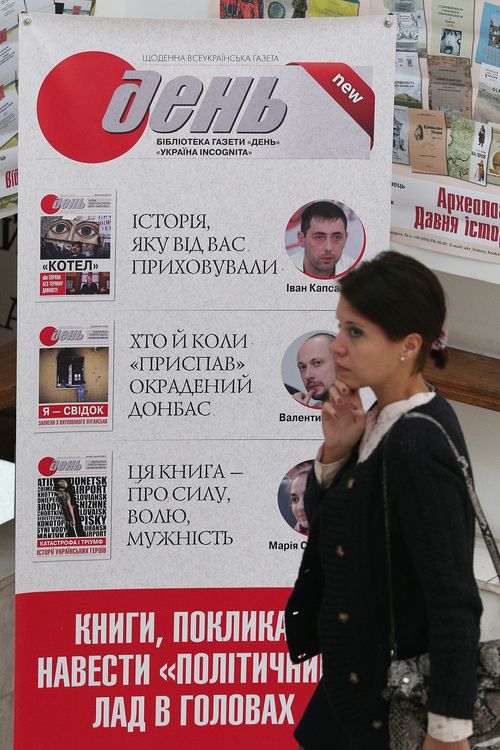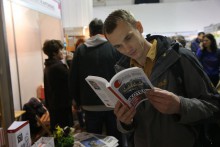Den’s Days are underway in Lviv, where besides the launch of the photo exhibit of the newspaper and the meeting of the editor-in-chief Larysa Ivshyna with the students of the National University “Lviv Polytechnic,” new books from our Library will be presented. A week earlier, the bestsellers of Den/The Day were presented at the International Book Forum in Warsaw. The visitors of the exhibit took a great interest in the trilogy about the modern history of Ukraine, “The Trap,” or A Case without a Statute of Limitations; I, an Eyewitness. Notes from the Occupied Luhansk; and Catastrophe and Triumph. The Stories of Ukrainian Heroes. Several months after the first press runs were released, the question of a new edition of the books was raised. And recently the world has seen new editions. Moreover, the first book in the triptych, “The Trap,” has been translated and published in English under the title A Case without a Statute of Limitations. This book is already a part of the NATO library. What is the reaction of the readers? Below we are offering for your attention some reviews of our readers, in particular, the readers of the books “The Trap,” or A Case without a Statute of Limitations and I, an Eyewitness. Notes from the Occupied Luhansk.
“THE MURDER OF GONGADZE HAS BECOME A TURNING POINT IN OUR HISTORY”
Oksana IVAKHNENKO, specialist on academic and methodical work, the education, culture, sport, and tourism department, Pryshyb United Territorial Community, teacher of history, Poltava oblast:
“At first I bought Return to Tsarhorod; I, an Eyewitness. Notes from the Occupied Luhansk, and Catastrophe and Triumph from your triptych, but ‘The Trap’ had been sold out before that. As soon as the second edition of ‘The Trap’ was published, I ordered it immediately. I am a history teacher, so I take interest in such publications. Having bought the books, I started to subscribe to your newspaper as well. For this is deep analytics. Speaking about the importance of a publicist triptych, I think that the perception of modern history shapes new world outlook. In its turn, it changes the society. As we change the society, we change our future as well. I am reading ‘The Trap’ at the moment, and I know Ivan Kapsamun as a regular contributor to Den, which is why I expect a deep analysis of the subject. I have felt intuitively before that the murder of Gongadze was a turning point in our history, and now, as I am reading the book, I see that I felt right.”
“EVERYONE WHO FEELS DEEPLY FOR LUHANSK REGION SHOULD READ VALENTYN TORBA’S BOOK”
Arkadii VENHEROV, Kyiv:
“At the beginning of past autumn, Valentyn Torba’s book I, an Eyewitness. Notes from the Occupied Luhansk saw the light. The author, as he notes in his ‘Word to the Readers’ at the beginning of the book, from the first day of exacerbation of the political situation in Ukraine in November 2013 till September 2014 was living in his hometown Luhansk. That is why the author of the book turned into an observer, sometimes a participant, of the events that were whirling in Luhansk at that time. Journalist Valentyn Torba wrote down his contemplations and observations in his diary, he was also shooting materials and publishing them on social networks and in the newspaper Den. The book I, an Eyewitness. Notes from the Occupied Luhansk based on these materials was published in summer 2015.
“In the book the author first and foremost is trying to find the answer to the most painful question which is for all Ukrainian patriots, ‘What happened to the people in the Donbas who voted for the independence of Ukraine almost unanimously (83.86 percent in Luhansk oblast), but later became adepts of separatism?’
“Valentyn Torba sees the reasons of the current events not only in the political crisis of 2013-14, but also looks for the answer in the first years of our independence, when in his opinion the ‘Donbas mechanism’ broke down and subsequently ruined. This approach of the author is quite logical, because the reasons of the ‘Donbas tragedy’ are indeed in the stormy 1990s.
“Unfortunately, the revolutionary processes in 1989-91 did not lead to a formation of a united democratic force, which could have taken the power from the Communist nomenclature in Luhansk oblast in August-September 1991.
“After the parliamentary elections in spring 1994 and especially after Leonid Kuchma won in the presidential elections in summer 1994, former members of the Communist Party, such as Petro Kupin and Viktor Tykhonov, came back to power in Luhansk oblast, and later they were joined by the rest, Oleksandr Yefremov, Valerii Holenko, and Volodymyr Prystiuk. In 1998 the power in the region was grasped by the former Communist nomenklatura. Only one small step was left to make from the openly anti-Ukrainian power of Tykhonov, Yefremov, Prystiuk, Holenko to the separatism of Plotnytsky, Tsypkalov, and Kariakin. It was made in Luhansk oblast in spring 2014 under the slogans of the ‘Russian spring.’

Photo by Ruslan KANIUKA, The Day
“This is the conclusion Valentyn Torba makes in his books. Any story always has prerequisites. And Luhansk is not an exclusion: the roots of separatism in Luhansk oblast should be traced not only in the Russian special operations in the east of Ukraine, but the entire flow of events in the country since mid-1980s till nowadays.
“‘On the scale of the future Ukraine awaits permanent transgression by Russia of not only its territory, but its identity and its inner core as well.’ (p.369)
“It is hard for any patriot of Ukraine to disagree with this statement of the author regarding the geopolitical reality.
“There is no doubt that everyone who feels deeply for Luhansk oblast should read Valentyn Torba’s book in order to reconsider the events of 2013-15 and find new ways for democratic development of Luhansk oblast.”
“THE PAGES FROM ‘THE TRAP’ ARE MARKED WITH A PENCIL”
Daria TRAPEZNIKOVA, Taras Shevchenko National University of Kyiv, Den’s 2015 Summer School of Journalism:
“I have always been outraged by the fact that only several lessons in the fifth and eleventh forms were given for studying of the history of independent Ukraine. At the age of 10, you hardly understand anything, whereas at the age of 17 you already want to think about prospects and make a choice. There is no time to contemplate about the past, even if it is a near one. The university course of history, which differed little from the school one, was abridged to eight lectures and an exam. No new pieces were added to my personal historical puzzle.
“But it is of vital importance to know what happened 10-15 years ago, when you were a child. Without this background it is hard to orient yourself in the context, correctly define the causes and assess the effects of everything that was going on, is going on, and will be taking place in our country, especially if you prepare to become a journalist, which means that you will be shaping the social opinion, and it is impossible to do that if you’re ignorant.
“Den gave me a powerful concentrate of important information gave me at the same time an impetus to filling gaps in my knowledge. Back in the time of studying at the Den’s Summer School of Journalism I understood one thing: this is what I had been looking for for many years. I bought these books immediately after the publication and started to plunge into the past.
“The first book, ‘The Trap,’ or A Case without a Statute of Limitations is dedicated to the Gongadze-Podolsky case and related events. At the same time, the selected texts embrace not only the murder of Georgy, but a considerably longer period of time and a considerable wider circle of personalities. The events of 2000 are placed in the general context of Ukrainian modern history, and the reader easily sees the cause-and-effect relations. Owing to this approach and presentation of the material it is easier to understand the huge meaning this case has not only for the Ukrainian journalism, but for the establishment of civil society in our state.
“It turned out that about some personalities who played an important role in the history of the period of independence I learned from these books. I also read a lot about the politicians about whom I hadn’t known everything.
“I especially like the fact that ‘The Trap’ is a collection of journalist materials, which I consider important historical sources. I want to come back to some interviews again and again. The pages with them are marked with a pencil, full of notes and exclamation signs. Some lines are prophetical, others inspire, like the quotation of Vadym Hetman in the interview of 1997, ‘We should count on nobody but God, the government we have elected, and ourselves. We must always remember that only a spineless person relies on foreign forces and success rarely visits a spineless person. Victory is only possible thanks to the actions, willpower, and brains of the one who wins. If we fail to rise above ourselves, we will be so worthless!’
“I am very thankful to the whole team of Den, the editor-in-chief Larysa Ivshyna and the compiler of the book Ivan Kapsamun for such a wonderful project. I know that the second edition has been released, which is only proof that there is a great need for such materials in the society. I believe that the newspaper will have enough strength and inspiration to publish similar collections about other acute moments in present-day Ukraine. I continue to read the trilogy and wait for new books eagerly.”
“RUSSIA IS IMPLEMENTING GENOCIDE OF UKRAINIAN PEOPLE”
Yurii SHCHERBAK, diplomat, publicist:
“The Revolution of Dignity (2013-14) and the aggression of the RF against Ukraine (2014-16) became events of worldwide historical importance. In spite of the victims and ruination, temporary loss of Crimea and part of the Donbas, Ukraine got an important victory over Putin’s regime – a moral-political, rather than a military one.
“In the chaos of the tragic events, in spite of the deep political crisis in the society, a new force which will define our future has been born in Ukraine. Before our eyes the Ukrainian nation of warriors and volunteers is emerging, and they are ready to defend our fatherland and undertake the responsibility for its future.
“There is no doubt that Valentyn Torba is one of the people who are the stronghold of Ukraine – two years ago he was a scarcely known journalist from Luhansk, and currently he is one of the most interesting Ukrainian publicists, an author of many articles, published in the newspaper Den, and also an author of the symbolical book I, an Eyewitness. Notes from the Occupied Luhansk.
“I had a great honor, as the head of the jury of the James Mace Award established by the newspaper Den, to make the decision on giving this prestigious award to Valentyn Torba.
“I have carefully read the voluminous book with huge amount of information about the events in Luhansk oblast unknown to the Ukrainian reader. This is a dramatic document of time, a collage of personal memories, stories of friends and acquaintances, official information, and, most importantly, the contemplations of the author.
“You can make many sad conclusions after reading this unique document, but the best phrase about this was said by the author in the chapter ‘Instead of an epilogue. A verdict.’
“As for me, the main conclusion is that Russia is leading an ethnic war against Ukraine, implementing genocide of the Ukrainian people. Valentyn Torba writes, ‘This crime of world scale is being committed on our example, and it must be punished.’
“Brilliant stylist and talented writer Valentyn Torba is expressing the thoughts and hopes of the new Ukraine, Ukraine that is waging a war, Ukraine after Maidan, Ukraine that will win.”







